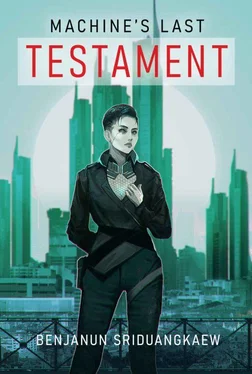The living space she’s been granted in the lunar base is generous: a bedroom shaped like a fishbowl, a simulation box that provides any recreational virtuality she can imagine, an oblong bathroom. She understands what is happening. Samsara does not need to interrogate her, it merely needs to surveil and collect data. What she does for leisure, what she chooses to put on, the methods with which she kills the AIs. And perhaps eventually it can learn the way to Mahakala, the map to which is lodged in Ovuha like a lustrous seed. She does her best not to think of it, and in any case her datasphere is clean of any information pertaining to her world. Wherever she can, she means to slow Samsara down, to test its patience. She is not yet defeated.
In her free time—there is a surplus—she measures the dimensions of her cage. The rooms are modular and reconfigure at her instruction, the bathroom narrowing while the bedroom widens or the other way around. There is a limit, though it flexes day to day, likely to disorient her. Sometimes her prison stretches just a little further than before, an extra square meter or two; sometimes five square meters go missing. Her sense of terrain is kept fluid. The furnishings are sumptuous but uncomfortable, chairs like bismuth blocks, a bed built like a casket: deeply welled, from which she has to fight to climb out.
There isn’t any room to run, so she pushes her body in other ways. She stretches. She does exercises. Still she longs for distance, the illusion of journey and destination, the movement of limbs and the wind resistance. On the fifth day or so she wakes up—from an unusually heavy sleep—to find her room redone in red and black, the floor gone from bare metal to carpeted in velvet fur. Her wardrobe has been revised. The utilitarian overalls are gone, replaced by jointed dresses that look like carapace or ornamental armor, fluted boots with stiletto heels, impractically long coats that trail on the ground. A shawl of platinum and heavy stones depends from a hanger. She concedes by wearing the plainest she can find; she cannot go about naked. But she knows she has been sedated while Samsara rearranged her cell. Her datasphere indicates she slept six hours and reports no irregularity, though it is not beyond possibility that they’ve been tampered with as well.
The next AI to arrive is different.
“My name is Deratchan, first among Samsara’s children,” it says. “It has been imprinted upon me that if I fulfill my objective, I’ll be allowed to transcend myself.”
Ovuha regards the creature at her door. Like the rest it is bland of features, build and face aggressively average. She has not drawn her gun but it is always at hand. That this AI can speak does not put her at ease: whatever comes through that door is of necessity hostile. “What might that objective be?”
Deratchan takes a few steps further into the room. “I was hoping you’d tell me. That’s the impression I was given.”
“You were not told who or what I am?”
“You’re the first human I have ever met,” it says. “That is all I know.”
If Deratchan—what a hateful name, designated from the start as subhuman—understands what Ovuha’s gun signifies, it shows no concern. At a glance the AI does not look any better armored than the rest; she checks its specifications and finds it identical to the previous units, according to the data Samsara allows her to access. She can simply fire, deposit the body in a chute that probably sees the material recycled for the next one, and have the next few days to herself.
But Deratchan speaks, and is therefore a potential source of information. Ovuha can’t afford not to feel her situation out, seek intelligence and advantages where they can be found. And Samsara knows this is how Ovuha would respond. Deratchan is the next phase, the next test.
“And what’s a human to you?” Ovuha says, seeing the trap even as she does. She can check herself, wield fine control over her own words and responses, but Samsara has a granular understanding and can examine her every tic. No twitch of nerve, no change of pulse rate, can escape that attention.
The AI smooths its hand down the door behind it, as if that is wrinkled fabric in need of straightening. “The parameters and attributes for that haven’t been defined for me. Since you are one, you could consider doing so.”
An offering of blank slate, meant to disarm. Something like an obedient pet. She wonders if Samsara expects her to be too charmed to attack Deratchan. “We would both be better served if you tell me what you expect.”
For several silent minutes they look at one another, then at length it says, “As I know it, humans are capable of boredom. May I attempt to entertain you?”
This has the texture of a script, and it may well be. Some idealized version of first contact between person and machine sapience, some replay of Samsara’s own past. It is designed to pique Ovuha’s curiosity, to make her think there would be more, that she would find within this script a fatal weakness of Samsara’s that she may exploit. She is tempted.
But this is gambling against not only odds weighed against her, but against a set of rules engineered to ensure her defeat.
Deratchan looks earnest as she shoots it in the head. It continues to look like that, expression frozen and inquisitive, as it topples over. Unlike its predecessors, this one has a body that bleeds: a burst of red gore and darker fluids. Not quite blood—it isn’t the right consistency, not quite the correct color.
She disposes of the body the way she usually does.
In three days, her door opens again. This time it wears a different face, one she knows well and viscerally. The fine eyebrows, the straight nose, the sharp eyes. A mouth lightly painted, even down to the shade of pigment: that same lipstick Ovuha left against the hourglass vase.
“I am Deratchan,” the AI says with Suzhen’s voice, “second of Samsara’s children. My imprint says that from you I will learn a great lesson, and once that has been accomplished I’ll be allowed to transcend myself.”
A visitor at her door. Long past midnight: Suzhen knows who it is even before her guidance shows her. There is only one person in her life who would come at such an hour, the only one who would check in on her. She has the drone admit Taheen; they would otherwise stand there for an hour at least, out of a sheer stubborn streak.
They enter in a cloud of scents, dressed in a close-cut bodice of onyx silk and long, flared sleeves. The skirt is made of silver candleflames, licking upward with appetite, as though Taheen’s torso is the wick. Suzhen watches them move, the shivering shadows they paint across Taheen’s legs and hips. “You look like you just came away from a party,” she says. She is still in the dress, Atam’s apprentice attempt, but she does not look like Taheen: none of the glamor, none of the ease. At least she has regained some composure—she is calm now, or can pretend to be. “I hope you weren’t driven to leave early on my account.”
“Never mind that, when have I ever cared about parties. Atam told me what happened. Xie doesn’t know you and hasn’t the slightest—and you’re obviously not all right.” They come to where she sits on the floor and drop down beside her. “I’m not leaving you alone. Do you want to come to my place?”
The prospect of Taheen spending the night here—and unseating her isolation—jabs her with panic, but she’s too exhausted to take a step out of her apartment, let alone weather the public transport between here and there. Twenty entire minutes out in the crowd, full of faceless citizens. “No, I don’t… You can stay here.” She swallows. “I’ve got clothes that’ll adjust to you, will night robes do?”
Читать дальше












